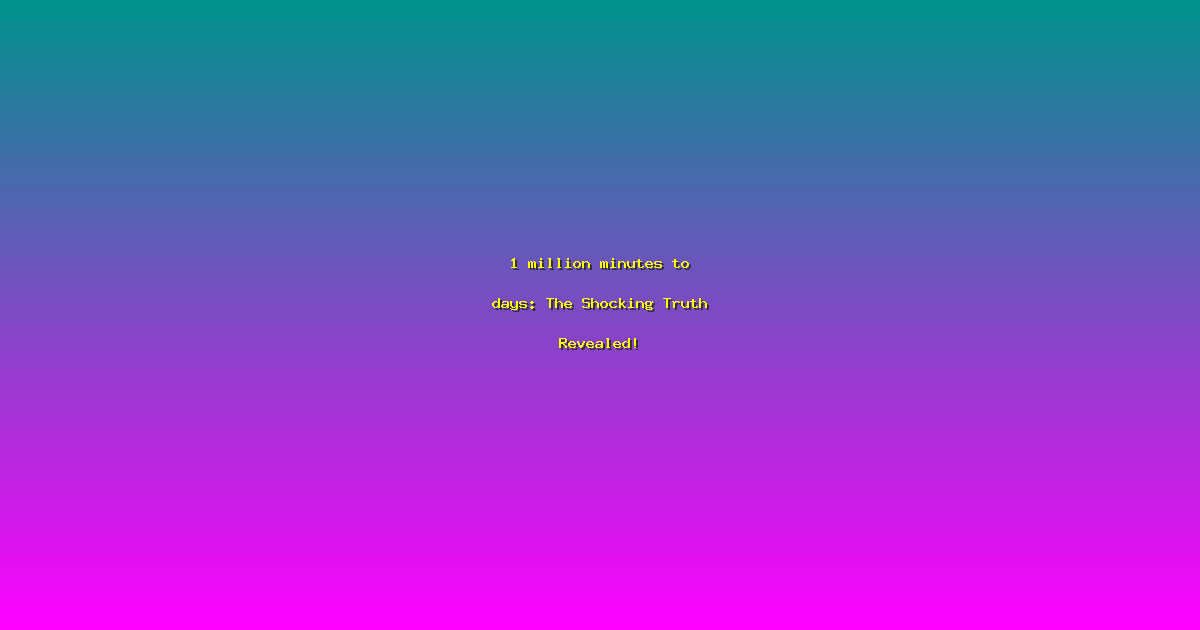1 million minutes to days: The Shocking Truth Revealed!
Imagine if you had 1 million minutes to spend on something. Sounds like a lot, right? But how much time is that really? The answer might surprise you. In this article, we’ll explore the conversion of 1 million minutes to days, and uncover how this can impact your daily life. Whether you’re looking to manage your time better or simply curious about the math, this guide will provide you with the insights you need. Let’s dive in and reveal the shocking truth behind 1 million minutes to days.
Understanding the Conversion: 1 Million Minutes to Days
Let’s start with the basics. How many days are in 1 million minutes? The conversion is straightforward: 1 million minutes is equivalent to approximately 694.44 days. This means that if you had 1 million minutes to spend, you would have nearly 700 days at your disposal. But what does this mean in practical terms?
- Key Point 1: To put this into perspective, 1 million minutes is roughly 2.4 years. This is a significant amount of time, and understanding this can help you better manage your daily activities.
- Key Point 2: Consider this: If you were to work 8 hours a day, 5 days a week, it would take you about 4.8 years to accumulate 1 million minutes of work time. This highlights the importance of time management and productivity.
- Key Point 3: According to a study by the American Time Use Survey, the average American spends about 1.8 hours per day on leisure activities. If you were to dedicate this amount of time to leisure for 1 million minutes, it would take you about 3.3 years.
Impact on Daily Life
Understanding the conversion of 1 million minutes to days can have a profound impact on how you manage your time. By breaking down this large number into more manageable chunks, you can better allocate your time and resources. Here are some practical applications:
- Key Point 1: Time management becomes crucial when you realize how much time you actually have. By setting clear goals and prioritizing tasks, you can make the most of your 1 million minutes.
- Key Point 2: According to a study by the Harvard Business Review, effective time management can increase productivity by up to 25%. This means that by optimizing your time, you can achieve more in less time.
- Key Point 3: Implementing a time tracking system can help you identify where you’re spending your time and make adjustments accordingly. Tools like Toggl and RescueTime can provide valuable insights into your daily activities.
Strategies for Maximizing Your Time
Now that you understand the conversion of 1 million minutes to days, let’s explore some strategies for making the most of your time:
- Key Point 1: One effective strategy is to break down your goals into smaller, manageable tasks. For example, if you have a project that will take 1 million minutes to complete, you can divide it into daily or weekly tasks to make it more achievable.
- Key Point 2: According to productivity expert Tim Ferriss, “The key to productivity is not working more, but working smarter.” This means focusing on high-impact tasks that yield the most significant results.
- Key Point 3: Implementing a time-blocking technique can help you stay focused and avoid distractions. By dedicating specific blocks of time to different tasks, you can ensure that you’re using your time efficiently.
Frequently Asked Questions
How can I convert 1 million minutes to days?
To convert 1 million minutes to days, you can use the following formula: 1 million minutes ÷ 1440 minutes per day = 694.44 days. This means that 1 million minutes is approximately 694 days and 10 hours.
What are some practical applications of this conversion?
Understanding the conversion of 1 million minutes to days can help you better manage your time. For example, if you’re planning a long-term project, you can break it down into smaller, more manageable tasks. This can help you stay on track and avoid feeling overwhelmed.
How can I use this knowledge to improve my productivity?
By understanding the conversion of 1 million minutes to days, you can set realistic goals and prioritize your tasks. For instance, if you have a project that will take 1 million minutes to complete, you can break it down into daily or weekly tasks to make it more achievable. This can help you stay focused and motivated.
Is there a common misconception about time management?
One common misconception is that working longer hours automatically leads to better productivity. However, research shows that working smarter, not harder, is the key to success. By focusing on high-impact tasks and minimizing distractions, you can achieve more in less time.
What are some advanced time management techniques?
Advanced time management techniques include the Eisenhower Matrix, which helps you prioritize tasks based on their urgency and importance, and the Pomodoro Technique, which involves working in focused intervals with short breaks in between. These methods can help you stay productive and avoid burnout.
Conclusion
Understanding the conversion of 1 million minutes to days can be a game-changer for your productivity and time management. By breaking down large amounts of time into more manageable chunks, you can better allocate your resources and achieve your goals. Whether you’re looking to improve your work efficiency or simply make the most of your leisure time, the insights provided here can help you transform your approach to time management. So, the next time you’re faced with a large project or goal, remember the power of 1 million minutes to days and use it to your advantage.
